March 20 - 26, 2016: Issue 256
The Royal Easter Show and 125th Celebration of the Hawkesbury Agricultural College: Farmers Feed Us!
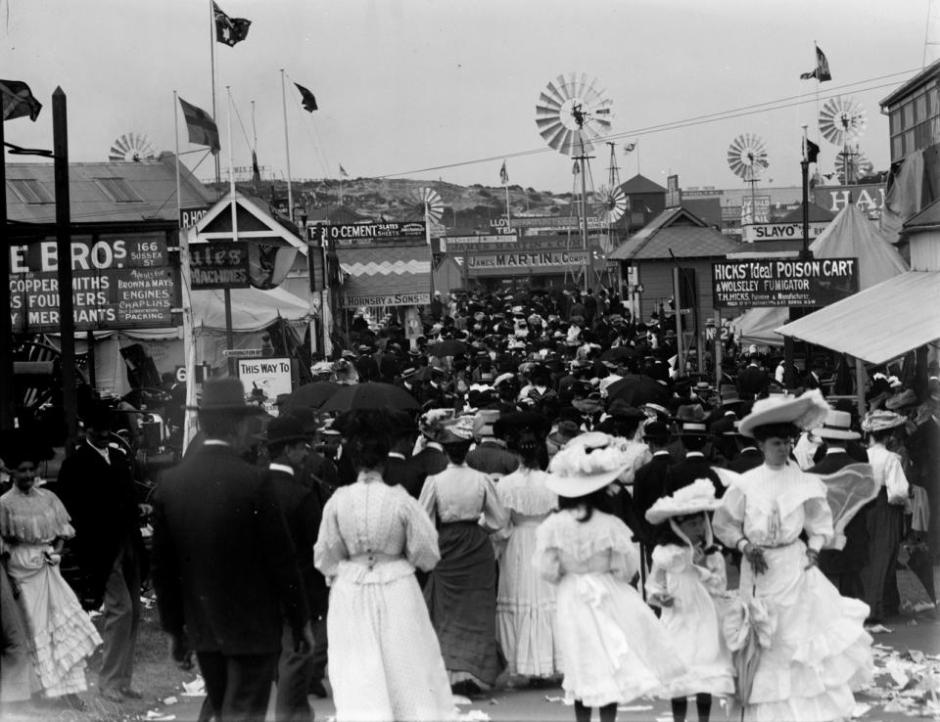
Royal Easter Show (Sydney, N.S.W.) circa 1910 - from album: 'Hawkesbury Agricultural College', part of The Hawkesbury Agricultural College : selection of photonegatives featuring agricultural activities, Images No(people entering Royal Easter Showgrounds) .: a4578003h and a4578005h. courtesy State Library of New South Wales
A few years ago we ran a small article on the origins of the Royal Easter Show - The Royal Easter Show Began As the Royal Agricultural Society of NSW – 1822
This celebration of where our food comes from, and why people love the main arena of the Royal Easter Show still, was echoed this week in the Western Sydney University’s celebration of the Hawkesbury Agricultural College, which marked the 125th official opening anniversary:
Celebrating 125 years of Hawkesbury campus
15 March 2016 – Western Sydney University
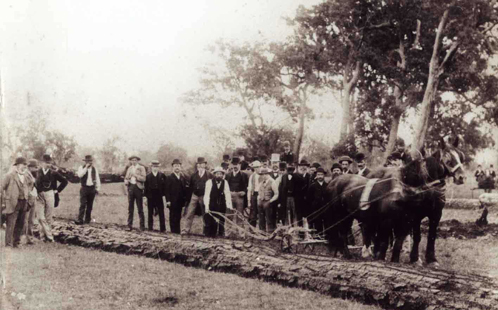
Sydney Smith turns the first furrow at the Hawkesbury Agricultural College, 1891
The date marks 125 years since the official opening of the College by the Honourable Sydney Smith, Secretary for Mines and Minister for Agriculture, on 16 March 1891.
Special guests at Wednesday's event included Professor Richard Bawden AM, Chair of the Hawkesbury Foundation, and Mr Neil Inall, HAC alumnus, as well as members of the University and alumni community. Also present will be 91-year-old Mr George Bennett, another HAC alumnus, who will help unveil a special plaque for the occasion.
Hawkesbury Agricultural College was the first agricultural college in NSW, and has played a formative role in developing the state's agricultural and horticultural industries.
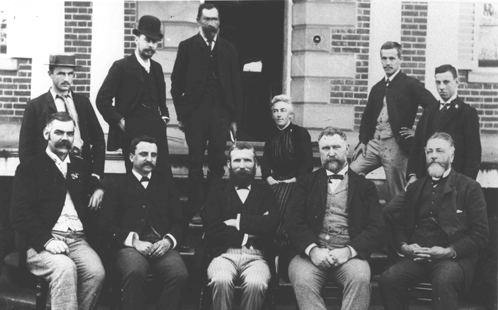
The Ministerial Group poses for a photograph at the opening ceremony, 1891
Another noteworthy former student is Andrew 'Boy' Charlton, who represented Australia at three Olympic Games. Charlton was already a well-known swimmer when he enrolled at HAC in 1923. He left the College in 1924 to attend the Paris Olympics where he broke the 1500 metre world record.
Vice-Chancellor Professor Barney Glover says the University is proud of the campus and its rich heritage.
"The Hawkesbury campus forms an important part of the University's long and distinguished educational history, and has continued to develop into a vital science, agriculture, technology and health precinct for the University – home to some of the most outstanding teaching and research facilities anywhere in the country," says Professor Glover.
"We are pleased to mark this 125-year milestone. The campus holds a very special place in the hearts of our Hawkesbury alumni, and we look forward to witnessing the achievements of the next generation of agricultural and scientific leaders, particularly as Hurlstone Agricultural High School prepares to be co-located on the campus from 2020."
The University is planning further activities throughout the year to mark the 125th anniversary of Hawkesbury Agricultural College and the campus.
The first 9 hole golf course constructed in the Richmond area was built at the Hawkesbury Agricultural College in 1897 and was followed by another 9 holes in 1898. The HAC also has the Hawkesbury Agricultural College Rugby Union Football Club, founded in 1891, and still going! This club has produced a number of Wallabies such as Robert Graves, John Klem, who was selected to play for the Wallabies while playing for Hawkesbury, Reg Smith, a renowned Wallaby who donated a series of rugby jumpers for display in the college bar for many years, Phil Clements, Warwick Watkins, Lars Hedberg, Michael Mathers, Jim Phipps, Graham Bailey, Jim Miller, Rod Moore and Scott Staniforth.
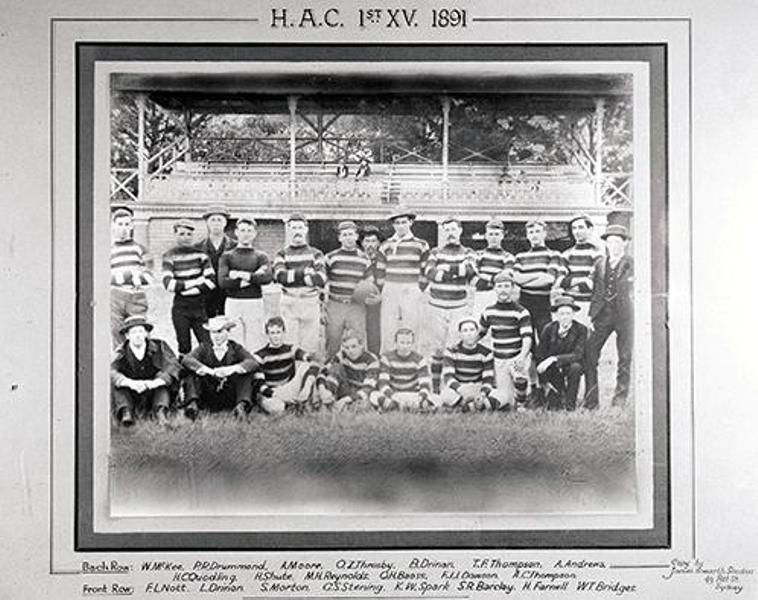
The Minister for Mines and Agriculture, accompanied by Messrs. Bowman and S. Burdekin, Ms.L.A., on Monday visited Richmond, and, in tho presence of a largo number of residents opened the temporary buildings of the Hawkesbury Agricultural College turned a couple of furrows of the land to be cultivated, and drove in a peg on the site of the buildings intended ;to be shortly erected. Mr. Smith delivered a lengthy address to the students, in which he dealt with what had been done by the Government, and what was intended to be done, and this speech was followed by others, in which Mr. Smith was warmly complimented on having accomplished so much in the direction of agricultural education. The visiting party returned to Sydney by the afternoon train, well pleased with the hearty welcome given by the Richmond people. Hawkesbury Agricultural College. (1891, March 21 - Saturday). The Cumberland Argus and Fruitgrowers Advocate(Parramatta, NSW : 1888 - 1950), , p. 6. Retrieved from http://nla.gov.au/nla.news-article86271496
WINDSOR AND RICHMOND "GAZETTE"
SATURDAY AUGUST 8, 1891.
Hawkesbury Agricultural College.
CLOSE OF THE FIRST SESSION.
THE first session of the above institution was brought to a close on Friday last, when a very large number of visitors and parents, from Sydney and elsewhere, were present in the Richmond School of Arts. Amongst those present, we noticed Rev. Dr Corlette, Messrs Thompson, Anderson (father of the Director of Agriculture),Stenning, Reynolds, Baas, Hodgkisson, Quodling, Dawson, and Rien; whilst the most prominent Hawkesbury residents were Mr. W. Gosper (Mayor of Windsor), Ald. Primrose, Holland and Davies(Windsor), Mitchell, Kelly, and Crisford(Richmond), Revs. J. Kinghorn, E. Hargrave, and Father Grace, Drs Helshamand Gibson, and others.
"July 30, 1891. Dear Mr. Thompson.-I very much regret that owing to the fact that a Cabinet meeting has been summoned for tomorrow morning at 11 o'clock, I shall be unable to be with you as I had hoped at the closing of the first session of the Hawkesbury Agricultural College. I had looked forward with pleasure to receiving your report on the conduct and progress of the first batch of students placed under your charge, and after the very pleasant tour of inspection I made a few weeks ago, when I saw how eagerly the students were pursuing the practical parts of their studies, with what thoroughness they were learning the minutest details, I was prepared to hear an equally good repot t of their progress on the scientific side. It is needless for me to remind the students that knowledge is power in agriculture as in everything else, and the man who brings science-that is, the abstract principles of all true knowledge-to bear upon his practical work is the man who will outstrip all others in the race for success. The aim of our college will be to turn out men equally good in practice and in theory, and L hope to find from your report that neither has been cultivated entirely at the expense of the other. What we want in our students is the spirit of inquiry, guided by well-directed scientific instruction, which should make every student turned out from our college the best farmer in his district in after life-the man whose place will be a model for others to copy, and who will at the same time be an authority upon all matters appertaining to the highest branches of his profession. Your good reports on their conduct have always been particularly welcome to me, as I ever feel that intellect without morals is of but little value in making a good citizen. However poorly a student may have progressed in his classroom or in his farm-work, if his conduct has been manly, truthful, courteous, and honourable, he may return to his parents with a light heart and feeling sure of their sympathy and favour. Kindly wish the students upon my behalf very happy holidays, and while congratulating those who stand at the head of their class in the different subjects, urge the others to renewed efforts and greater zeal and energy nest session. I am, &c., (signed)
SYDNEY SMITH."
The Chairman then called upon the Principal of the College, Mr Thompson.
THE PRINCIPAL'S ADDRESS.
Mr. Thompson said : We have met to-day to formally close the first session of the Hawkesbury Agricultural College. I am pleased to see so many friends present, seeing that the proceedings this time are not of so much importance as they will be at the Christmas vacation, when numerous valuable prizes will be awarded. I am especially pleased to see ladies present, and I hope they will continue to take an interest in the proceedings and progress of the institution. I am also pleased to observe members of the Press present. To one and all, on behalf of the College, I tender a hearty welcome. It is a matter for extreme regret that the Minister is not present to-day. An unfortunate Cabinet-meeting has unfortunately detained him in Sydney. The number of students on the roll all told is 30, but owing to sickness and other causes, only 25 came up for examination. A little band certainly, but you are aware that many great institutions have developed from small beginnings, and there is little doubt but it will also be the case with regard to the advancement of agricultural education in this colony. It is rather a slur on the people of New South Wales, the premier colony of the Australian group, that a system of agricultural education by actual demonstration in class-room and field combined, was not inaugurated many years ago. Whatever vicissitudes overtake this institution in the future, it will always redound to the credit of the present Minister for Agriculture, the Hon. Sydney Smith, M.P., for establishing a system which bids fair to eclipse in comprehensiveness that of all the other Australian colonies. It must be apparent to all that the time was fully ripe for taking this wise step. It is absurd to suppose that anyone without a systematic training can undertake advanced farm-management. For such work it is necessary to obtain a knowledge of the classification and proper methods of cultivating the soil, the tillage implements of the farm, the use of modern machinery and appliances tending to save laborite management of live stock, the care and management of trees and other plants, and many other things in connection with farming pursuits and new industries. An apprenticeship is required and demanded with regard to all artizans. Now it is just as difficult to build a proper hay-stack as a brick wall, or to work a reaper-and-binder as compared with a printing machine. Many other such instances might be given; enough are given, however, to illustrate my meaning. It is a noted fact that the successful farmers of the present day, in the Australian colonies as elsewhere, are men who have obtained a thorough early training in all that pertains to rural life, whilst on the other hand those who have commenced farming late in life without any previous training, find it very hard to make both ends meet, and not unfrequently have to face the Insolvent Court. The reason for this is that they cannot utilize to the full the heritage Nature has given them, viz, the land of these great colonies. I am sorry to notice that a number of what should really be our very best students, not only here but in Victoria also, have a great desire to drop what is termed "the science part" of the educational course. Now, although my sympathies are with the thoroughly practical man, believing that proficiency can only be obtained by constant practice, and that the farmer must be made by a thorough training in farm-work, I do not under-value scientific knowledge, and it must be apparent to all that the student who is conversant with the names of plants and animals, and the tools requisite for his work, has a much better chance of success than those who have no such knowledge. The more important scientific subjects, and those which our students will have an opportunity of studying before the completion of their course are as follows : Geology, which treats of the structure and mineral constituents of the earth’s crust; Botany, which investigates plants, their structure, life-history, diseases, &c ; Zoology deals with all matters pertaining to the structure and classification of animals. Under the same head may be mentioned Entomology, the study of insect life, with the best means of eradicating insect pests; Chemistry, or that science by the aid of which we gain a knowledge of the composition of soils, feeding stuffs, manures, plants, &c. Surveying and levelling is also an important subject, more especially in a country like our own, where irrigation is likely to be extensively used, and much land must undoubtedly be converted to the use of agriculture. A knowledge of how to survey and take levels would be invaluable to any Australian farmer, whilst a proper method of book-keeping is of the utmost importance. As a rule, farmers are deficient in this matter. They go on year after year without knowing the true state of their affairs. This may bring about disastrous results-whereas if they kept a set of books they could see at any time how things stood. By means of the system of double-entry, and a periodical stock-taking, the farmer may demonstrate the real state of his position. If he is losing money on any particular line he could do away with it, and strike out for something fresh, or extend his operations in those lines that really are paying a good return.
The difficulty is to be able to give the science which is needed for the comprehension of the Processes of agriculture in a form easily assimilated by the youthful students. The Professor of Agriculture in the leading Agricultural College of the United States says:-" We have no use for a Professor who is not able and willing to teach the agricultural features of his science ; and in each" of the several departments of this Institution," agricultural instruction is not merely secondary" and incidental, but it is the culminating feature," the objective point of all instruction in that" department. We have not a department but is "thoroughly loyal to agriculture. The Student" cannot get away from it; he gets the flavour of it' in everything. No Agricultural College may ever" hope to succeed until agriculture is thus taught," directly or indirectly, within its walls-until the "spirit of industry, of manual labour if you please," becomes the atmosphere of the Institution, to be "taken in by the very breath of every Student."
We do not desire to turn out scientists at the Hawkesbury Agricultural College ; but men so versed in science that they may be the better able to cope with the difficulties that may overtake them whilst cultivating the soil, or in managing their live stock.
The word or term " science" is often confounded by agriculturists with the term " theory." Now, Webster is very clear on this point. The term "science" means knowledge of principles and causes-ascertained facts. Science is literally knowledge; scientific principles are involved in every process that a man in his daily work performs. Science, therefore, is closely associated with practice, while the terms " theory" or" theoretical" are properly used in opposition to terms "practice" and "practical."
The operations on the Common, notwithstanding the many difficulties we have had to contend with, have progressed fairly well. Fencing, clearing, ploughing, &c., are now being vigorously pushed forward. We intend, during August and September, to plant experimentally and otherwise a good breadth of potatoes, and about 50 acres of maize, sorghums, millets, broom-corn, &c., &c.
I have submitted to the Minister for his approval rough plans for the necessary farm buildings, viz,-Stables, cow-sheds, piggeries, fowl-houses, wool-shed, barn, slios, cart-sheds, dairy, apiary, and also particulars of the stock required for the proper equipment of the Institution from an educational stand-point. The latter comprises Shorthorns, Herefords, Polled Angus, and Devon Cattle, which may be termed the representative beef-producing breeds; with Aryshire, Jersey, Brittany, Holstein, and Kiama stock as representing the dairy breeds.
In sheep I propose having the following representative breeds :-Merinos, Lincolns, Leicesters, Cotswold, Southdowns, Shropshire Downs, and Roraney-marsh.
The pig has not been forgotten. I propose having Berkshire, Poland China, and White Yorkshirebreeds, and see what can be done by judicious crossing to produce a good butcher's pig.
All the breeds of poultry will be represented. In fact, when a Student leaves this Institution he should be thoroughly conversant with the characteristic points and management of all kinds of livestock, and should at the same time be well up in the management and growth of all varieties of farm crops, fruits, and, indeed, in plant life generally.
I know I have an up-hill fight before me, to get the place into thorough working order, and properly equipped, so that it may be in some measure worthy of this great colony. But I do not despair of success, and I sincerely trust that the value of the institution, both to the country at large and to the district around, will not be crippled for the want of funds.
A commencement has been made with the gathering together of objects to be placed in the College museum. Numerous specimens, illustrating the animal and plant life of our district, have been stored away. They comprise mollusca, mammals, frogs, lizards, grasshoppers, spiders, centipedes, and other insects, snakes, plants, varieties of maize, &c &c. It is intended that the museum shall contain as complete a collection as it is possible to obtain of objects illustrating agriculture and farm life generally, together with the natural history of our district. It will without doubt be of great use for teaching purposes when fully established.
Our Library now contains upwards of 250 books, together with numerous pamphlets treating of agriculture and its kindred sciences. It is being added to almost daily, partly by purchase and partly by donations from similar institutions in various parts of the world. We hope to add in time a good selection of books for general reading in history, travel and biography, whilst some good novels will not be omitted.
I am well pleased with the class of students who have presented themselves for the first session. The majority are of the right age to benefit from a course of instruction at an institution of this kind.
The progress made, considering the difficulties we have had in the inauguration of the college and farm, has been satisfactory; most of the young men before me have come here with a sincere and earnest desire to benefit from the instruction the institution can offer, and will no doubt turn out first class men, capable of taking their places among the leading agricultural men of the colony,
There are a few, however, on the other hand, who seem to have come here to fill up & portion of their lives, without any apparent aim at advancement in the calling they have chosen.
A young man, with the assistance of his parents and guardians, should first of all decide what occupation he is to follow through life. His own natural inclinations should be encouraged as far as possible, but once he has commenced to climb the ladder, there should be no looking back.
Forward, Onward, Excelsior, should be his motto.
A man that sticks to one ladder with perseverance will some day reach the top, but he who starts on many ladders, and, after a few steps, becomes dissatisfied, and desires a change, thinking he can do much better at something else, will fritter his life away, and succeed at nothing. The general conduct of the students has been fairly satisfactory, taking into consideration the fact that the temporary collegeis not well arranged for discipline and supervision, and is in the centre of a town.
I feel my responsibility with the young men, under our present circumstances, very keenly, and I shall be very glad to have them comfortably housed on the College-farm, away from town influences. If a young man has decided on a rural life, the sooner he is weaned from town attractions the better.
There is much more enjoyment to my mind in studying the works of Nature on a farm than in living in a town. Farm life can be made pleasant, comfortable and attractive. The rural home can be beautified by planting a garden and establishing clumps of trees about the place, whilst a great variety of crops can be grown, giving change of employment to all hands and causing a certain amount of variety in the work: To those fond of live stock, a life in town would be intolerable. To my mind a country life is infinitely better in everyway than is that of a town, and if I had my days to commence over again, I would, without hesitation, choose life on a farm in preference to any other vocation under the sun. In times gone by, it was the dunce of the family that was usually relegated to a farming-life, but competition has now become so keen that we want the best brains, the best intellects, and the best all-round men to cope successfully with the many difficulties we have now to contend with. One thing, however, is assured that land has, and always will give a bountiful return to the intelligent cultivator, and seeing that our professions and vocations in town are already over-manned, every encouragement should be given to young men to settle on the soil.
I am under great obligations to the people of Richmond for the great interest they have taken in the students; if is very gratifying to me to see that such is the case.
Although we have not as yet been able to enter into the more important work of an educational training Farm, I am happy to say that the Students have performed the work allotted to them in a highly satisfactory manner.
Our work has comprised-The clearing of land, filling in stump-holes, fencing, carpentering, carting, ploughing, gardening, milking, and attending to stock. It may be termed pioneering work, and I am glad the Students have recognised the dignity of labour. Work is one of the best practical educators of character. It evokes discipline and obedience, self-control, attention, application and
perseverance. It is the law of our being, the living principle that carries men and nations forward. Labour may sometimes be a burden, and a chastisement, but it is also an honour and a glory. All that is great in man comes through work, and civilization is its product. Idleness is the curse of man, not labour.
The following are the awards allotted:
Quodling 98 Throsby 90 Moore 88Thompson, A.C. 86 Baass 85 Andrews 80 Dawson 80 Welsh 80 Wright 78 Thompson, T. 77 Corlette 76 Bridges 76 Drummond 76 Drinan, B. 76 Drinan, L 75 Farnell 75 Dark 75 Stening 74Reynolds 74 Morton 72 McKee 72 Sparke 72 Hodgkinson 71 Rein 71 Thompson, B.L. 68 Gray 70
The subjects treated on in the class-room, and outside, have been the various breeds of horses, the tillage implements of the farm, soils, &c. Two papers were set for the examinations, and the results are recorded elsewhere. An epitome of the papers will give some of the subjects dealt with :
No. 1 Paper-Origin, history, characteristic points, &c., of the Clydesdale, Suffolk-punch, Shires-horse, Percheron, Cleveland-bay, the racer, trotter, hackney, cob, lady's horse, Indian remounts, and the various breeds of ponies; the management of breeding mares; breaking-in horses; selection of horses for farm purposes; ration for draught horse, &c., &c.
No. 2 Paper-The tillage implements of the farm, origin and improvement of same, and approximate cost, viz, ploughs (various kinds, including sub-soilers, digging, stump-jumpers, &c.),scarifiers, harrows, disc-horrows, steam cultivation, seed-drills; the composition of soils, and how formed; the advantages and disadvantages of certain soils from an agricultural stand-point; cultivation necessary for various crops, &c.
The Papers sent in by Students on the Principles of Agriculture have surprised me. The majority have exceeded my expectations by far. Of the large number it might be said that they would do credit to any such institution, and they might be published and seen by anyone. I really had not imagined that the Students had grasped the subjects in the way they have done.
The paper on live stock this session dealt more particularly with the horse and its common diseases. The heads are as under:
Dentition of the horse ; exterior parts of a horse, showing what parts are most liable to, to malformations and disease; the cause, symptoms, and treatment of pink-eye, lampas, fistula, splints, capped hock, wind-galls, grease, ring-bone and side-bone, colic, inflammation of the bowels, feet-founder ; also, bleeding, firing and blistering, drenching, and giving a horse a ball; the uses of a seton and enema; homoepathic and allopathic treatment.
Very excellent answers have been sent in by the majority of the Students, and the following are the marks allotted; Quodling 93 Thompson A.C.87 Bass 87 Moore 86 Rein 86 Dark 81 Drinan, B. 81 Drummond 81 Corletie 81 Farnell 81 Stening 81 Spark 78Dawson 77 Drinan, L 76 Welsh 76 Reynolds 75 Wright 74 McKee 74 Thompson T. 72 Morton 65 Andrews 63Throsby 62 Gray 60Hodgkinson 58 Thompson 51 - Average, 75 4.
Instruction on the preparation of land for tree planting has not been neglected, and a paper dealing with this subject, set and examined by myself and Mr. Stieme, has shewn that the Students fully appreciate the importance of this subject. An epitome of the paper is as follows;- Preparation of the land; protection, systems of planting; the effect trees have on the climatic changes of a country mulching trees; the eucalyptus family, and the various uses the timber can be applied to; the exotic trees in Richmond Park; the importance of knowing the botanical names of trees and plants.(Mr. Musson has taken great pains in instructing the Students in this matter.) The necessity for pruning; different systems 'of pruning; the advantages and disadvantages of leaving fruit-trees such long stems; result of practical demonstration in pruning, as shown by Mr. Stieme, dealing with the peach, apple, and other fruits.
Baass 97 Quodling 97 Moore 96 Corlette 91 Thompson, AC 90 Farnell 88Dark 85 Dawson w 84 Stening 84Wright 82 Drummond 79 Throsby 79Welsh 79 Thompson T. 79 Drinan B. 74Gray 73 McKee 73 Andrews 69Drinan L. 61 Hodgkinson 60 Morton 60 Thompson, BL 42 - Average, 80.
In conclusion I have to acknowledge the cordial support I have at all times obtained from the Director (Mr. Anderson) and his officers in connection with the work of the institution-and also take this opportunity of publicly acknowledging the loyal co-operation and able assistance I have at all times received from the officers associated with me in the management and working of the college and farm. There has been perfect unanimity of feeling and purpose and all has gone on harmoniously and well. I can assure you one and all are anxious to give their very best services for the advancement of the institution, and the Minister is to be congratulated on his selection of officers. I wish the students one and all a pleasant and enjoyable holiday and that you will all report yourselves on Monday the 17th August in good health and vigour, prepared to follow up the course of instruction.(Applause).
WINDSOR AND RICHMOND "GAZETTE". (1891, August 8).Windsor and Richmond Gazette (NSW : 1888 - 1954), p. 3. Retrieved fromhttp://nla.gov.au/nla.news-article72540625
The Burdekin Medal so often mentioned in graduation reports – where it stems from:
Hawkesbury Agricultural College.
For the encouragement of students of the Hawkesbury Agricultural College, Mr. Sydney Burdekin, M.P., has intimated his intention of presenting gold medals to the most successful students in the following subjects :
1. Proficiency in dairy farming in all its branches.
2. Veterinary science and practice, including horse-shoeing on newest and best principle. 3. Proficiency in garden and orchard work generally.
An inquiry having been addressed to the Department as to the best kinds of apples to grow for the export trade to England viz., which would bear the voyage and suit the market-the accompanying list has been prepared by the orchard manager at the Hawkesbury Agricultural College, and is here reproduced for the benefit of fruit growers throughout the Colony :
Adams' Pearmain, Bed Baldwin, Golden Bienette, Bedfordshire Foundling, Blenheim Orange, Bienette de Canada, Triomphe de Luxemburg, Winter Pearmain, Five Grown Pippin, Ward's Seedling, Bed Warrior, Mere de Menage, Kentish Pippin, Boston Russet, Claygate Pearmain, Gloria Mundi, Newtown Pippin, Stone Pippin, Bed Streak, Boyal Busset, Striped Beefing. Hawkesbury Agricultural College. (1891, June 27). Windsor and Richmond Gazette (NSW : 1888 - 1954), , p. 3. Retrieved from http://nla.gov.au/nla.news-article72540283
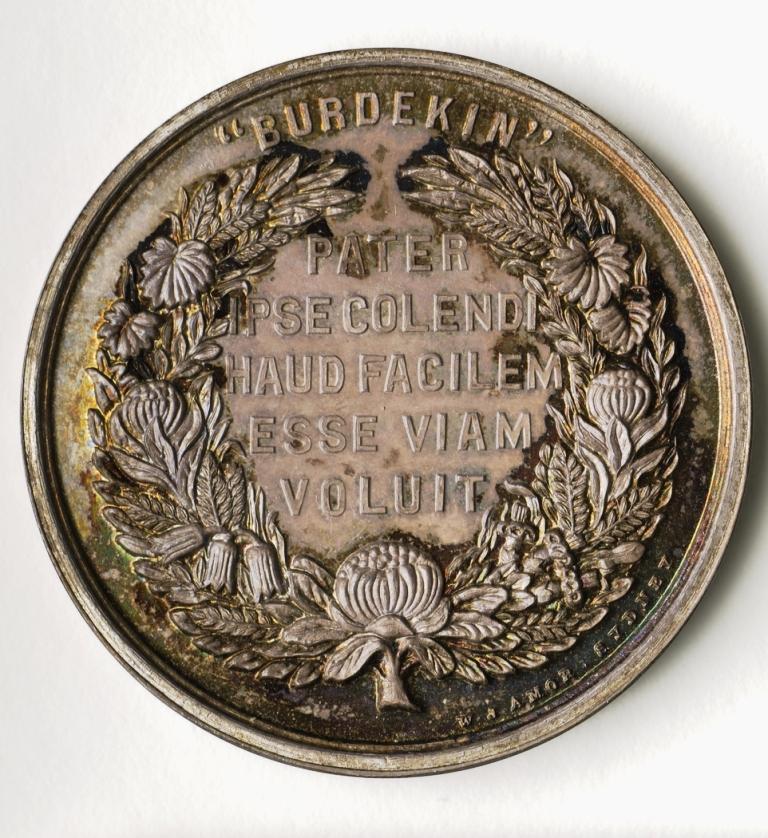
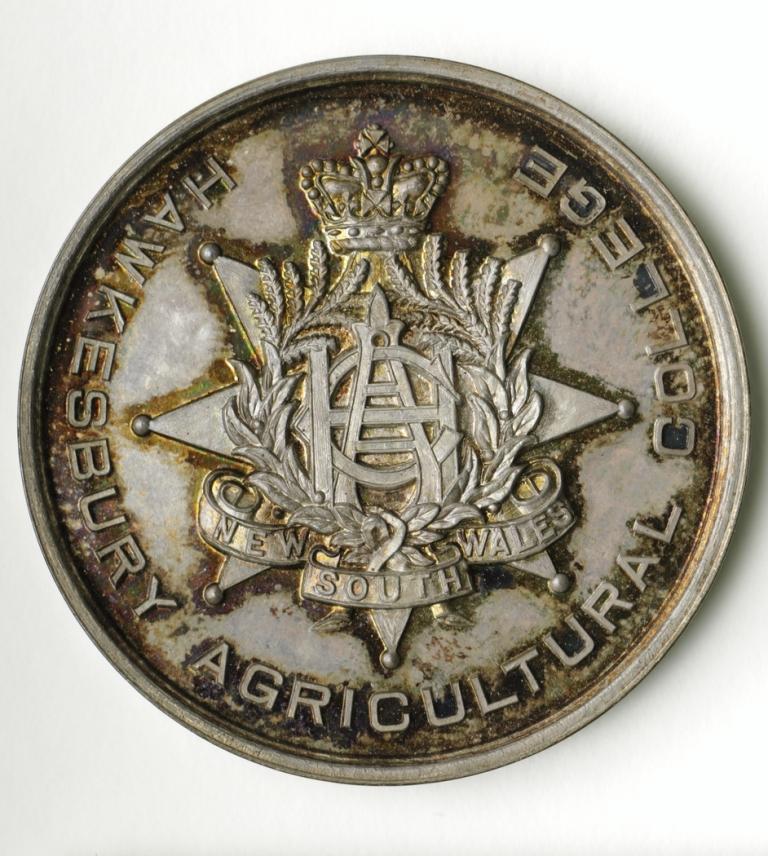
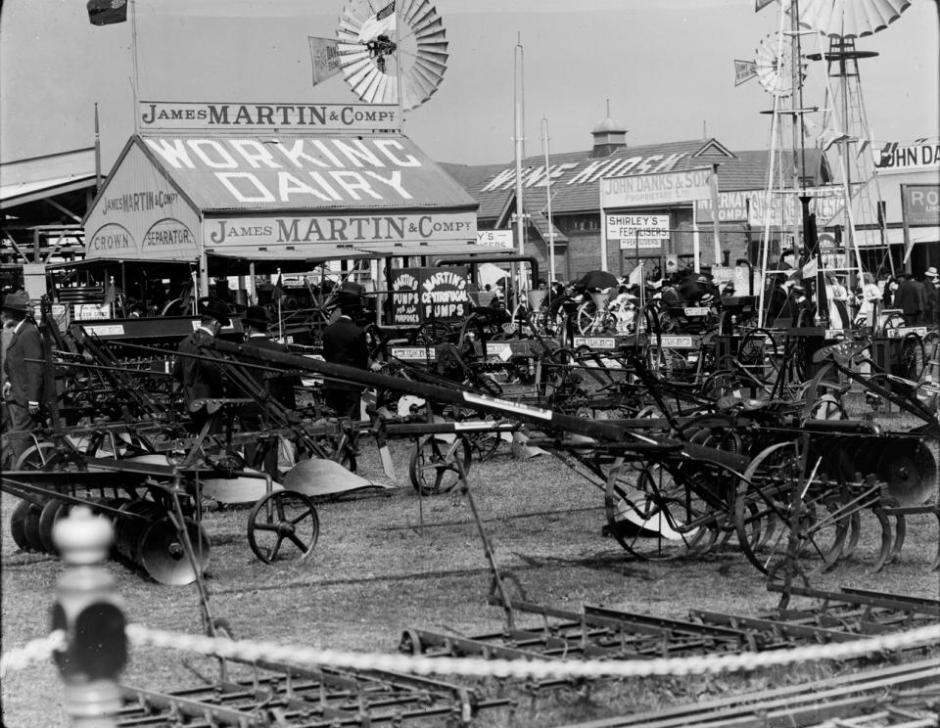
Royal Easter Show (Sydney, N.S.W.) circa 1910 - from album: 'Hawkesbury Agricultural College', part of The Hawkesbury Agricultural College : selection of photonegatives featuring agricultural activities, Image No(ploughs and harvesters) .: a4578004h. courtesy State Library of New South Wales
A few pictures of what went on at the Hawkesbury Agricultural College once buildings had been established
HAWKESBURY AGRICULTURAL COLLEGE.
The initiation of an agricultural college for the mother state was mainly due to Mr. Sydney Smith, Minister of Mines and Agriculture, by whom the present site was selected for a college farm. A commencement was made by renting two houses in Richmond, the engagement of a principal and staff. The ceremony of formally opening the college was performed on March 16, 1891, when Mr. J. L. Thompson, formerly of Dookie, was appointed principal, and opened the college with 25 pupils.
A college was projected, and subsequently built on the present site, and occupied in 1895, with 89 resident pupils. At the present time the area enclosed and suitably subdivided is 3,430 acres, of which 1.100 acres are under cultivation. One hundred acres are devoted solely to experimental work, and are under the charge of a skilled agriculturist. The course extends over two years of four sessions, to enable a student to qualify for the college diploma.
The curriculum includes the study of the principles of agriculture, agricultural chemistry, botany, meteorology, entomology, engineering, bacteriology, surveying, applied mechanics, farm bookkeeping, veterinary science and practice, practical training in the technique of agriculture, horticulture, dairy farm management, butter and cheese making, carpentry, blacksmithing, sheep and wool, poultry, live stock, pig raising and curing, &c.
Students are also permitted to take up special courses on the dairy, orchard, poultry farm, piggery, experimental plots, and farm extending over periods of from six to twelve months. The fee is £25 per annum, which covers the cost of board, lodging, and tuition. The minimum age at which students are admitted is 16. There is no limit beyond that.
Some 800 pupils have been trained already, and of these about 75 per cent, are known to be absolutely engaged in rural occupations.
During the recent examinations twenty students were tested in the senior or diploma class; of these thirteen have secured the college diploma, eleven were in the second class, and all passed the first year's examination excepting one; in addition a large number of special certificates were awarded for the single-course terms on the daily, piggery, orchard, and other departments.
The college is very popular, and great difficulty is experienced in providing accommodation for the applicants for admission. This session opens on January 23, when 145 resident students will be enrolled. The vacancies for the following three sessions are fully applied for. Twenty-seven new rooms, forming the new wing, were built last year, and the foundations of a similar wing on the western side are already in to provide a similar number of new rooms for next session.
Mr. H. W. Potts, F.C.S., F.L.S., has filled the position of principal for the last 2 ½ years, and under his able management, assisted by his staff of qualified masters, the college not only maintains its high standard of success and popularity, but yearly advances in every department.
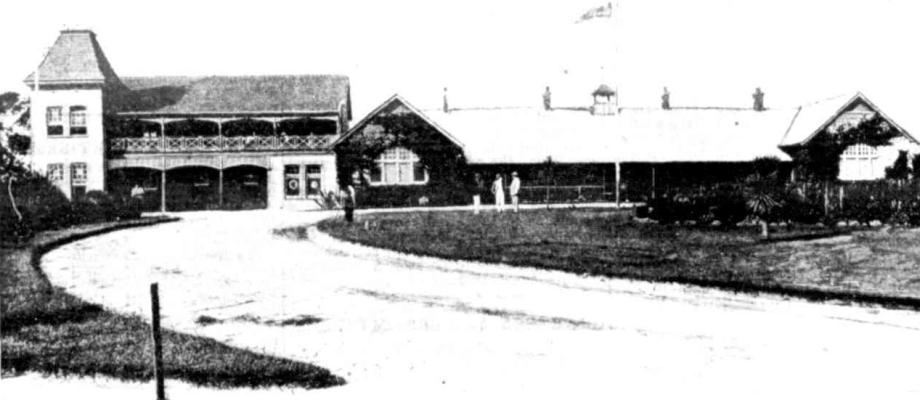
MAIN BUILDINGS OF THE COLLEGE
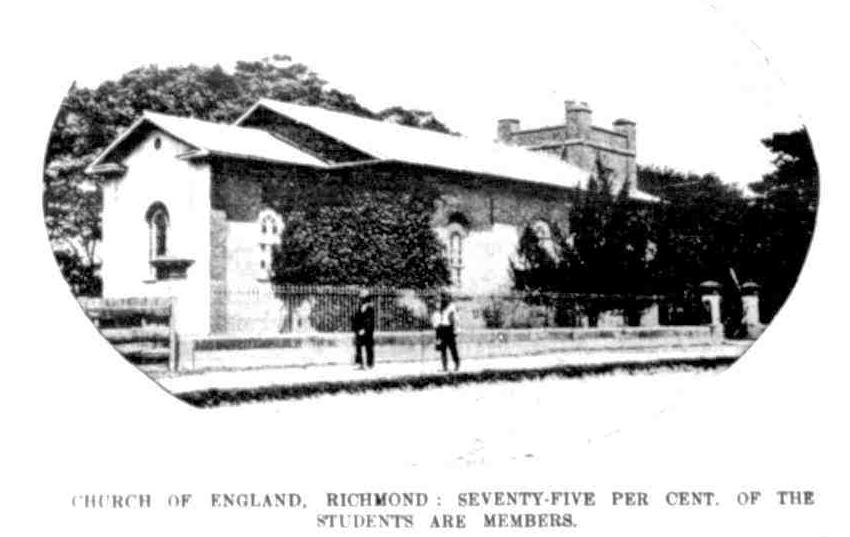
CHURCH OF ENGLAND, RICHMOND: SEVENTY-FIVE PERCENT OF THE STUDENTS ARE MEMBERS
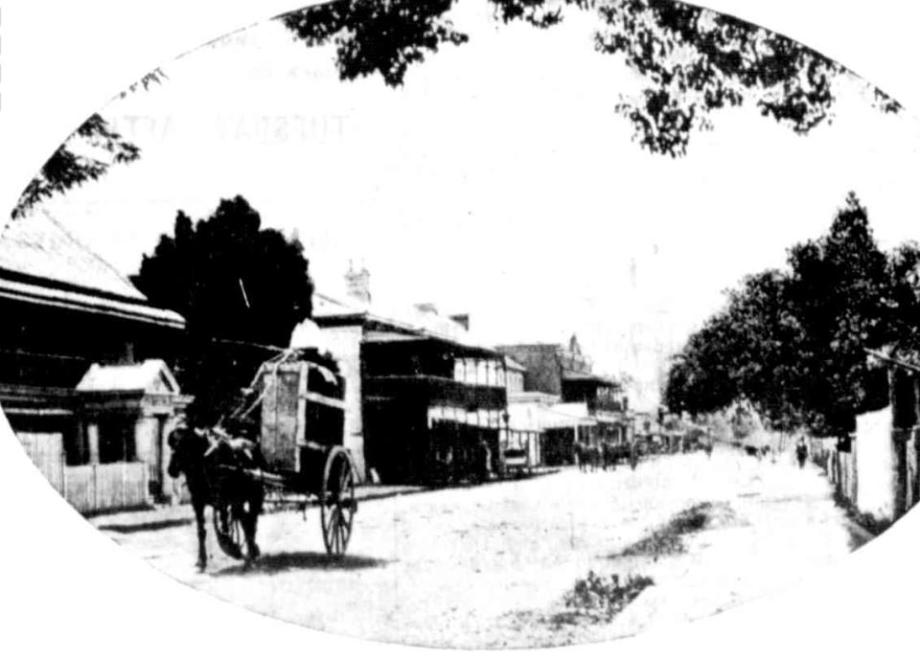
MAIN STREET OF RCIHMOND, THE TOWN NEAR WHERE THE COLLEGE IS SITUATED
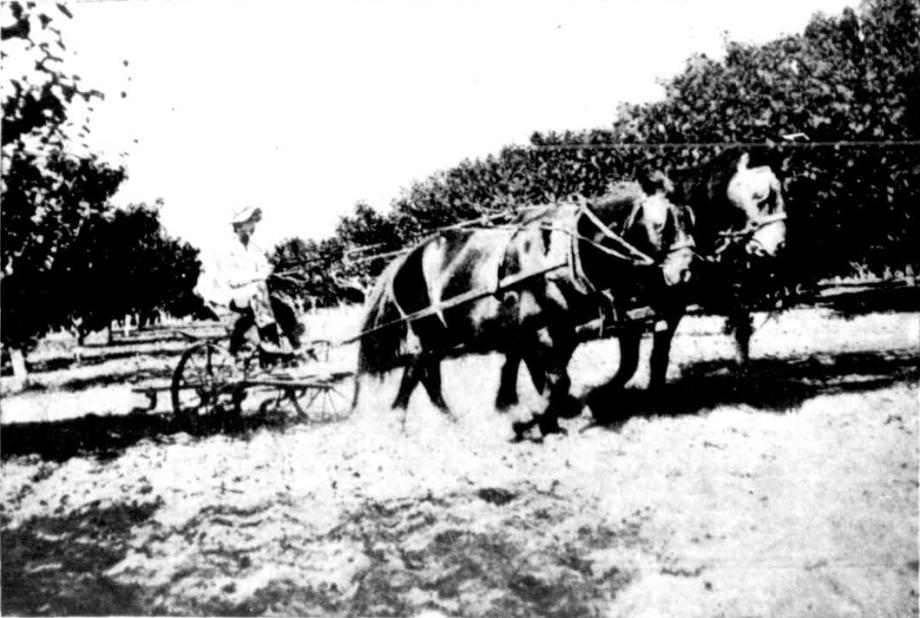
CULTIVATOR AT WORK IN THE ORCHARD
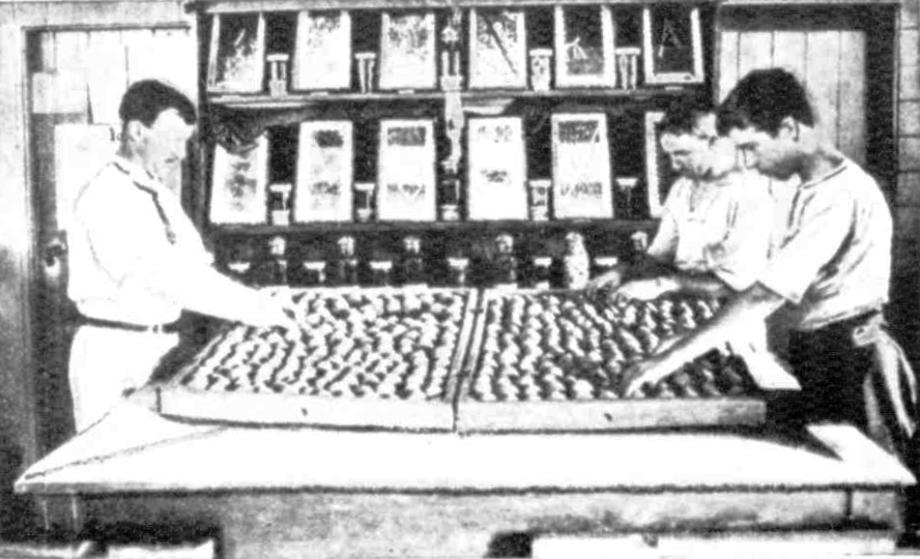
CANNERY : GRADING FRUIT.
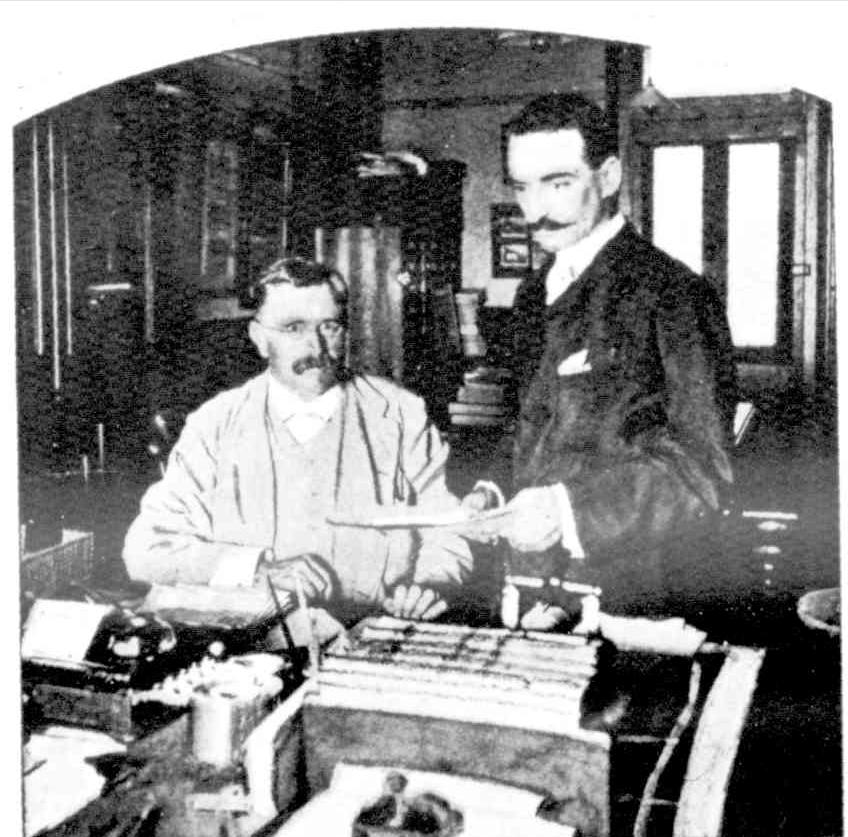
THE PRINCIPAL (MR. H. W. POTTS. F.C.S., I.L.S.) AND THE REGISTRAR (MR. V. F. ADAMS).
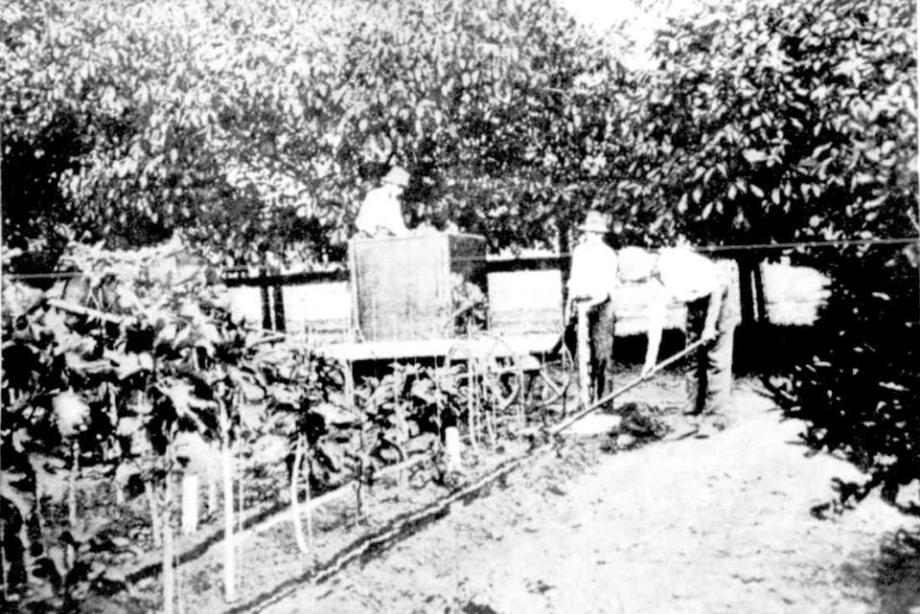
IRRIGATING THE SMYRNA FIGS
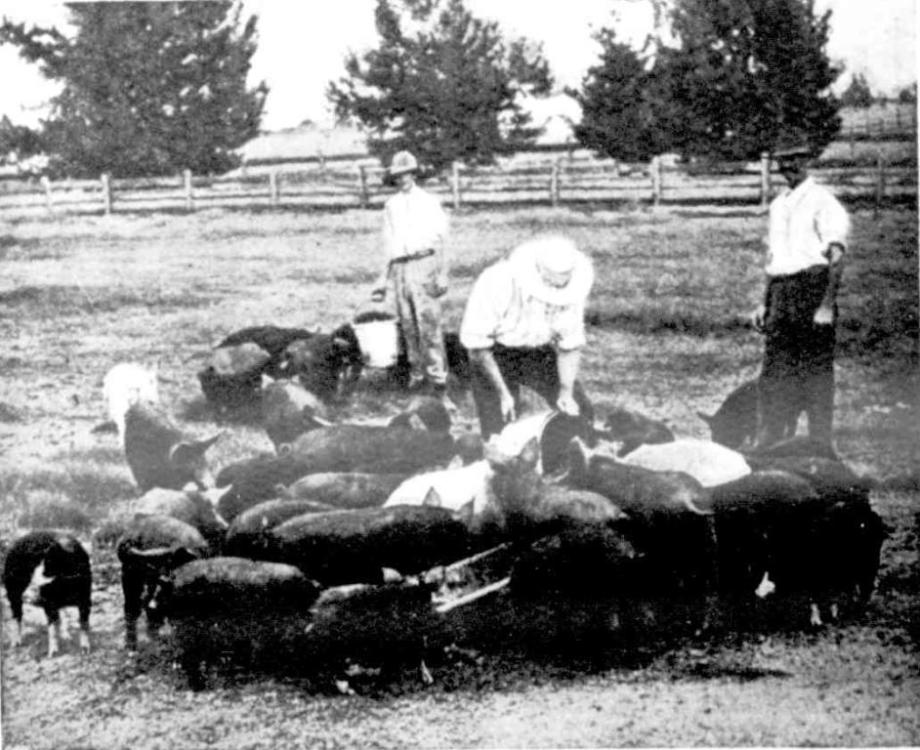
FEEDING PEDIGREE PIGS
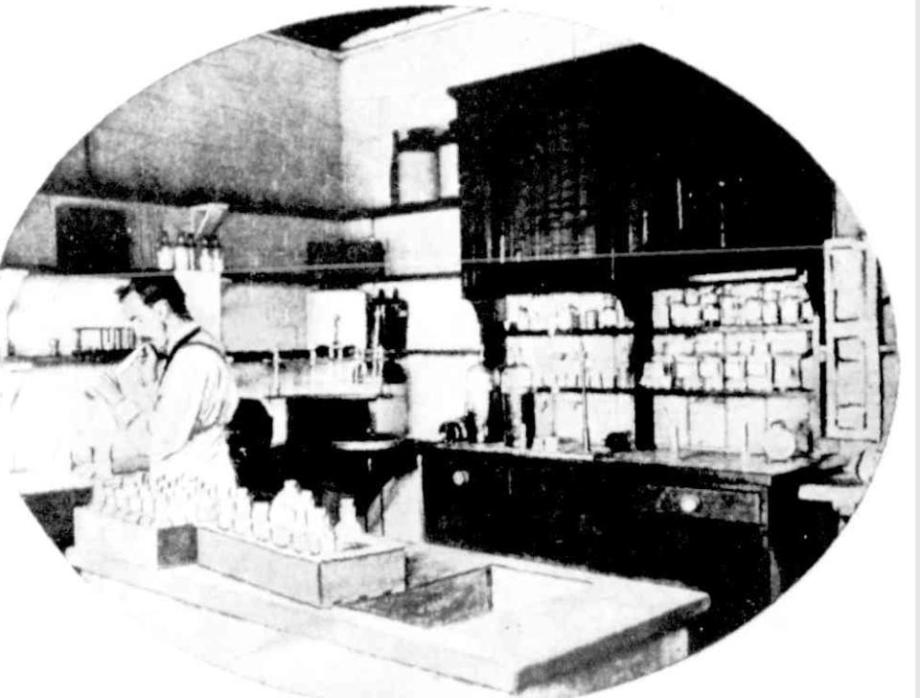
THE LABORATORY AT THE DAIRY.
HAWKESBURY AGRICULTURAL COLLEGE, RICHMOND, NEW SOUTH WALES. HAWKESBURY AGRICULTURAL COLLEGE. (1905, January 21). The Australasian (Melbourne, Vic. : 1864 - 1946), , p. 27. Retrieved from http://nla.gov.au/nla.news-article140778518
HAWKESBURY AGRICULTURAL COLLEGE. DIPLOMA DAY.
The annual distribution of diplomas, certificates, and prizes was made by his Excellency Sir Harry Rawson, at the Hawkesbury Agricultural College on Thursday. His Excellency, accompanied by Miss Rawson, Mr. and Mrs. Harrison Smith, Captain Wilson, and Miss Wilson, arrived by special train in the morning. Among other visitors were Messrs. S. W. Moore, Minister for Mines and Agriculture, and Mr. W. S. Campbell, Di-rector of Agriculture. After lunch the visitors wore shown over the various departments of the college by the principal, Mr. W. H. Potts. The presentation of the prizes was then made by his Excellency, who in addressing the gathering referred to the remarkable progress of the Institution since its inception, until it ranked at the present time as one of the best agricultural colleges in the world.
The Minister for Mines and Agriculture said that though the college was only about 15 years old, it had turned out about 900 young men, qualified to take their part in the development of the greatest of the primary industries of the State. A high value was attached to the work of the college, and on behalf of the Government he desired to say that the Government would continue to do its part in supporting so useful an institution.
Mr. Potts, principal of the college, spoke in warm terms of the application and diligence of the students, and said that the constant requests for the services of the students on stations, farms, dairies, cheese and butter factories, and sugar plantations, afforded proof that the training of the youths was sound and effective.
At night a dance was held in the college gymnasium, and was attended by about 200 guests.
Appended is the prize list:
Diploma Students, 1906.-E. F. Young, Curlewis, Dux of College, principal's gold medal, diploma, Burdekin medal, first aggregate prize, best practical student, sheep and wool prize, veterinary science prize and best with blacksmith; R. M. Boydell, Melbourne, diploma, Burdekin medal, second aggregate prize, best in dairy; J. W. Radfield, Sydney, diploma, Burdekin medal, third aggregate prize; W. Brown, Darlinghurst, diploma, Burdekin medal; C. G. F. Grant, Cairns, Q., diploma, Burdekin medal; E. R. Langlands, Pelaw Main, diploma, Burdekin medal, best on plots; G. Woodburn, Stanmore, diploma, Burdekin medal; Y. C W. Ormiston, Cowra, diploma, Burdekin medal; R. M. Newton, Coopernook, diploma, Burdekin medal, best in orchard, best with carpenter, best on piggery, best in garden; T. T. Hoole, Albany, Cape Colony, diploma, Burdekin medal; A. .loubert, Chinderah, diploma, Burdekin medal, best with engineer; G. W. Traill, Burwood, diploma; C. W. Beeson, Turramurra, diploma, Burdekin medal; W. H. L. Ripper, Kellerberrin, W.A., diploma. Burdekin medal; P. W. Chapman, Orange, practical certificate (farm, dairy, and orchard, best on poultry); J. M. Giles, Sydney, practical certificate (orchard and dairy); G. C. J. Machattie, Bathurst; L. G. McPhillamy, Cookardinia; E. J. Lindsay, Bathurst; W. G. Graham, Moss Vale; A. N. McCormick, Hobart, Tas.; H. A. Hogg, Wallendbeen, practical certificate (dairy and orchard) ; E. A. Isaacs, Sydney, practical certificate, farm and dairy.
First Year Students, 1906.-R. G. May, Dunolly, first year certificate, first aggregate prize, best on farm, best with blacksmith; W. L. Waterhouse, Chatswood, first year certificate, second aggregate prize, best on orchard, best with engineer, best on poultry, best on piggery;
P. Van Der Merwe, Bethlehem, Orange River Colony, first year certificate, third aggregate prize; A. B. Goard, Murrurundi, first year certificate, best in garden; H. C. Knibbs, Ashfield, first year certificate; O. V. Munford, Dubbo, first year certificate; H. D. Barlow, Dubbo,; first year certificate, best with carpenter; H. G. Watt, Balderodgery, first year certificate; G. N. Lockhead,; West Maitland, first year certificate; R. L. C. Royle, Wahroonga, first year certifícate; H. E. Wren, Bega, first year certificate, best on dairy, best on plots; G. S. Galloway, Moree; J. N. Whittet, West Maitland; D. N. Forsyth, Burwood; R. D. Owen, Wahroonga; A. A. White, Granville; R. H. Burnell, Parramatta, first year certificate.
Practical Class, 1906.- G. O. Dorward, Deniliquin, first aggregate prize; C. E. H. Puckle, Toorak, Vic., second aggregate prize; H. K. Chapman, Sydney, third aggregate prize.
Special Course, Students, 1906.-Farm Class: V. L. Moore, New Angledool; A. C. Campbell, Randwick; H. Spenceley, Ipswich, Q.; H. S. Douglas, Woollahra, farm certificate.
Poultry Class.-A. F. Gray, Bathurst; H. J. Shaw, Wallerawang, poultry certificate.
Piggery Class.-O. R. Charlton, North Sydney; D. D. Kilgour, Chatswood: N. Landeshut, Brighton, Vic.; F. L. Ross, Wallsend, piggery certificate.
Dairy Class, January to June Session, 1906.-P. H. Clements, Freeman's Reach, Department of Agriculture's prize for best butter-maker; G. W. Reilly. Petersham, Department of Agriculture's prize for best cheese-maker.
Dairy Class, July to December, 1906.-C. Hanffeld. Parraba, Department of Agriculture's prize for best cheese-maker; G. A. Price, Annandale, Department of Agriculture's prize for best butter-maker.
Orchard Class.-V. Cooper, Randwick; B. V. Rogers, Croydon, orchard certificate.
Special Prize Essays (cheque for five guineas each).-. Points of the horse in health and disease, G. C. J. Machattie. Anatomy and diseases of the horse's leg and foot, E. P. Young. How to make cheese and cure bacon, F. Smith. How to make a poultry farm pay, P. fl. Gilder. How to make a dairy farm pay, D. B. F Wilson. I.
H.A. College Ambulance Class, MOO.-The following students gained the certificate:-G. Addison, H. N Harlow,-H. F. Hoyden, !.. C. J. Broughton, H. K. Chapman, P. W. Chapman, O. R. Charlton, P. E. Clements, W. J. Cox, J. A. Croll, A. Davidson, P. AM Dingwall, C. O. Dorward, N. Dougall, O. I,. Evers, W. S. Farmer, D. K. Forsyth, .I. J. Gillies, A. H. Coard, A. It. Oowing, A. F. Gray, R. B. Hedley, R. M. Hore, K. B. Jamieson, R. G. Johnson, D. 1). Kilgour, E. I Langlands, H. M'Donald, G. C. Machattie, R. G. Marr W. L. Mooro, N. Morrisby, G. A. Price, O. E. N. Puckley K. Reynolds, W. H. T. Ripper, B. V. Rogers, H. H. Ross, S. N. Smith, H. Spenecley, H. N. Snodgraas, R, Squire, L. K. Timbrell, U. A. Traill, W. L. Waterhouse, M. G. Watt, A, A, White, J. N. Whittet, R. A Wilson, H. E. Wren. HAWKESBURY AGRICULTURAL COLLEGE. (1907, April 27). The Sydney Morning Herald (NSW : 1842 - 1954), , p. 11. Retrieved from http://nla.gov.au/nla.news-article28153128
The Royal Easter Show and 125th Celebration of the Hawkesbury Agricultural College: Farmers Feed Us! - threads collected and collated by A J Guesdon, 2016.